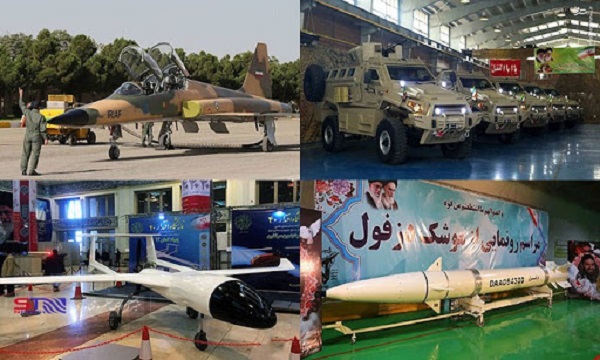Iran Never to Negotiate on Defense Capability
 “As for Iran’s defense capability, there has never been, there is no and there won’t be any negotiation,” Khatibzadeh said, adding that the American officials know it well that the issue of the defense capability is out of question and has nothing to do with the Joint Comprehensive Plan of Action.
“As for Iran’s defense capability, there has never been, there is no and there won’t be any negotiation,” Khatibzadeh said, adding that the American officials know it well that the issue of the defense capability is out of question and has nothing to do with the Joint Comprehensive Plan of Action.
He made it clear that according to the content of the JCPOA and the UN Security Council Resolution 2231, the issue of Iran’s missiles is a finished issue.
The diplomat added that all resolutions were annulled on January 16, including resolution 1929, noting that a few restrictions that linger will be annulled in January 2023.
Referring to the incoming US National Security Advisor Jake Sullivan’s remarks, Khatibzadeh reiterated that no talks will take place on JCPOA and his words have domestic consumption.
Incoming US National Security Adviser Jake Sullivan told CNN on Sunday that the assassination of Iranian commander Qassem Soleimani did not make America safer or protect US interests.
Sullivan also addressed the possibility that a new nuclear deal with Iran will tackle the issue of its ballistic missile capabilities, something of particular concern to Israel.
“Our view is that Iran’s ballistic missile program has to be on the table,” he said.
In relevant remarks last month, Iranian Envoy and Permanent Representative to the UN Majid Takht Ravanchi rejected any request for renegotiation over the Joint Comprehensive Plan of Action (JCPOA), stressing that Iran will never accept renewed talks over the nuclear deal as it is against the UN Security Council Resolution 2231.
“The JCPOA is an agreement coming out of hard-won negotiations involving difficult gives and takes, and any proposal for its revision, renegotiation or extension will be against resolution 2231 and absolutely not acceptable to Iran,” Takht Ravanchi made the remarks during a meeting of the UNSC on “Non-Proliferation: implementation of Security Council resolution 2231 (2015)."
He made it clear that the European members to the JCPOA and the European Union have practically joined the US and failed to live up to their commitments explicated in the agreement.
The envoy went on to say that the US and certain Western governments have instigated war, insecurity and instability in the volatile West Asian region through their interference and bullying policies.
Outgoing US President Donald Trump, a stern critic of the historic deal, unilaterally pulled Washington out of the JCPOA in May 2018, and unleashed the “toughest ever” sanctions against the Islamic Republic in defiance of global criticism in an attempt to strangle the Iranian oil trade, but to no avail since its "so-called maximum pressure policy" has failed to push Tehran to the negotiating table.
In response to the US’ unilateral move, Tehran has so far rowed back on its nuclear commitments four times in compliance with Articles 26 and 36 of the JCPOA, but stressed that its retaliatory measures will be reversible as soon as Europe finds practical ways to shield the mutual trade from the US sanctions.
Tehran has particularly been disappointed with failure of the three European signatories to the JCPOA -- Britain, France and Germany -- to protect its business interests under the deal after the United States' withdrawal.
On January 5, Iran took a final step in reducing its commitments, and said it would no longer observe any operational limitations on its nuclear industry, whether concerning the capacity and level of uranium enrichment, the volume of stockpiled uranium or research and development.
Meantime, US President-elect Joe Biden has recently said in a CNN article that he wants a renegotiation of the contents of the deal before he agrees to rejoin the agreement.
“I will offer Tehran a credible path back to diplomacy. If Iran returns to strict compliance with the nuclear deal, the United States would rejoin the agreement as a starting point for follow-on negotiations. With our allies, we will work to strengthen and extend the nuclear deal's provisions, while also addressing other issues of concern,” he wrote, mentioning that he wants changes to the contents of the nuclear deal and guarantees from Tehran that it would be open for compromise to strike multiple deals over its missile and regional powers as well as a number of other issues that have been the bones of contention between the two sides in the last four decades.
In response, Zarif had stressed that the US has violated the nuclear deal and is in no position to ask for any conditions for its return to the JCPOA, adding that it's Tehran that has its own terms to allow the US back into the internationally endorsed agreement.
The foreign minister has reiterated time and again that Tehran would not change even a single word of the agreement, and cautioned the US that it needs to pay reparations for the damage it has inflicted on Iran through its retreat from the nuclear agreement and give enough insurances that it would not go for initiating the trigger mechanism again before it could get back to the deal.
